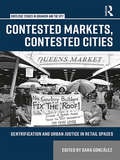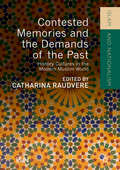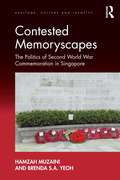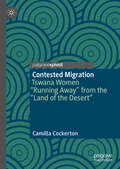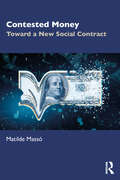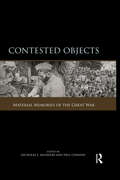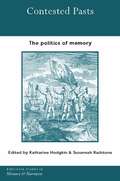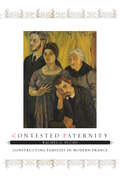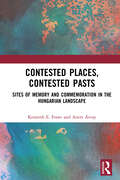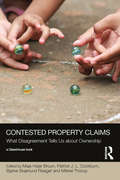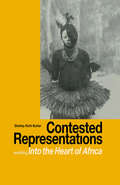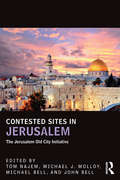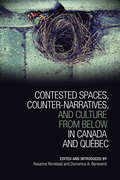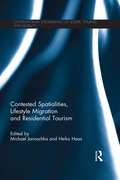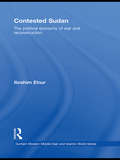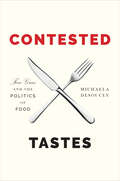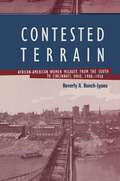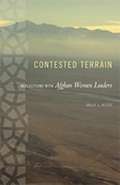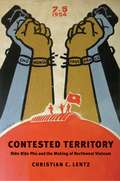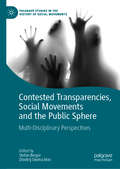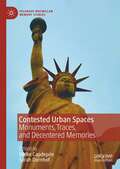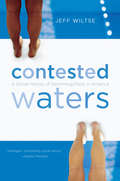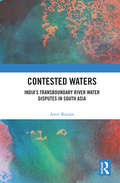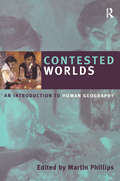- Table View
- List View
Contested Markets, Contested Cities: Gentrification and Urban Justice in Retail Spaces (Routledge Studies in Urbanism and the City)
by Sara GonzálezMarkets are at the origin of urban life as places for social, cultural and economic encounter evolving over centuries. Today, they have a particular value as mostly independent, non-corporate and often informal work spaces serving millions of the most vulnerable communities across the world. At the same time, markets have become fashionable destinations for ‘foodies’ and middle class consumers and tourists looking for authenticity and heritage. The confluence of these potentially contradictory actors and their interests turns markets into "contested spaces". Contested Markets, Contested Cities provides an analytical and multidisciplinary framework within which specific markets from Mexico City, Buenos Aires, Santiago de Chile, Quito, Sofia, Madrid, London and Leeds (UK) are explored. This pioneering and highly original work examines public markets from a perspective of contestation looking at their role in processes of gentrification but also in political mobilisation and urban justice.
Contested Memories and the Demands of the Past: History Cultures in the Modern Muslim World (Islam and Nationalism)
by Catharina RaudvereThis book brings together new perspectives on collective memory in the modern Muslim world. It discusses how memory cultures are established and used at national levels - in official history writing, through the erection of monuments, the fashioning of educational curricula and through media strategies - as well as in the interface with both artistic expressions and popular culture in the Muslim world at large. The representations of collective memory have been one of the foremost tools in national identity politics, grass-root mobilization, theological debates over Islam and general discussions on what constitutes 'the modern in the Middle East' as well as in Muslim diaspora environments. Few, if any, contemporary conflicts in the region can be understood in depth without a certain focus on various uses of history, memory cultures and religious meta-narratives at all societal levels, and in art and literature. This book will be of use to students and scholars in the fields of Identity Politics, Islamic Studies, Media and Cultural Anthropology.
Contested Memoryscapes: The Politics of Second World War Commemoration in Singapore (Heritage, Culture and Identity)
by Hamzah Muzaini Brenda S.A. YeohThis book sets itself apart from much of the burgeoning literature on war commemoration within human geography and the social sciences more generally by analysing how the Second World War (1941–45) is remembered within Singapore, unique for its potential to shed light on the manifold politics associated with the commemoration of wars not only within an Asian, but also a multiracial and multi-religious postcolonial context. By adopting a historical materialist approach, it traces the genealogy of war commemoration in Singapore, from the initial disavowal of the war by the postcolonial government since independence in 1965 to it being embraced as part of national historiography in the early 1990s apparent in the emergence since then of various memoryscapes dedicated to the event. Also, through a critical analysis of a wide selection of these memoryscapes, the book interrogates how memories of the war have been spatially and discursively appropriated today by state (and non-state) agencies as a means of achieving multiple objectives, including (but not limited to) commemoration, tourism, mourning and nation-building. And finally, the book examines the perspectives of those who engage with or use these memoryscapes in order to reveal their contested nature as fractured by social divisions of race, gender, ideology and nationality. The substantive book chapters will be based on archival and empirical data drawn from case studies in Singapore themed along different conceptual lenses including ethnicity; gender; postcoloniality, tourism and postmodernity; personal mourning; transnational remembrances and politics; and the preservation of original sites, stories and artefacts of war. Collectively, they speak to and work towards shedding insights to the one overarching question: 'How is the Second World War commemorated in postcolonial Singapore and what are some of the issues, politics and contestations which have accompanied these efforts to presence the war today, particularly as they are spatially and materially played out via different types of memoryscapes?' The book also distinguishes itself from previous works written on war commemoration in Singapore, mainly by social and military historians, particularly through its adoption of a geographical agenda that gives attention to issues of politics of space as it relates to remembrance and representations of memory.
Contested Migration: Tswana Women “Running Away” from the “Land of the Desert”
by Camilla May CockertonThe migrant has been designated the central or defining figure of the 20th and 21st centuries. For much of this period, research and theory have centred on adult men as representative, ignoring women’s part in international migration. Similarly, in Botswana, most history books on migration focus solely on men’s experiences. Weaving together history, theory and migrant women’s own words, this book reveals Tswana women’s multifaceted participation in the cross-border flows from colonial Botswana to pre-apartheid South Africa. Women succeeded in “running away” despite the opposition of Tswana and colonial male authorities. This book celebrates women’s agency and determination in creating new social networks, finding employment, and supporting children and families.
Contested Money: Toward a New Social Contract
by Matilde MassóDiscussing money is always accompanied by controversy as well as enchantment. Debating what money is and how it performs its main functions in the contemporary economy is fundamental to understanding the social consequences of money transformation associated with the digital revolution. This book explores the links between the current and prospective properties of money, its production, and its relationship to the concepts of value, the common good, and innovation. Contested Money opens a debate on the role that money could play in a different paradigm based on a renewed conception of monetary properties and functions that are capable of having a positive impact on social and individual welfare. Massó outlines the fundamentals of this monetary model, which would operate as a parallel currency, where the processes of monetary and value creation are connected in a new deal between the citizen and the state, grounded on an approach of reciprocal rights and responsibilities. This book will appeal to scholars, students, and, more broadly, readers interested in a contemporary understanding of what money is, how it is being transformed, and the role that it can play in redefining the twenty-first-century social contract.
Contested Objects: Material Memories of the Great War
by Nicholas J. Saunders Paul CornishContested Objects breaks new ground in the interdisciplinary study of material culture. Its focus is on the rich and varied legacy of objects from the First World War as the global conflict that defined the twentieth century. From the iconic German steel helmet to practice trenches on Salisbury Plain, and from the ‘Dazzle Ship’ phenomenon through medal-wearing, diary-writing, trophy collecting, the market in war souvenirs and the evocative reworking of European objects by African soldiers, this book presents a dazzling array of hitherto unseen worlds of the Great War. The innovative and multidisciplinary approach adopted here follows the lead established by Nicholas J. Saunders’ Matters of Conflict (Routledge 2004), and extends its geographical coverage to embrace a truly international perspective. Australia, Africa, Italy, Germany, France, Belgium and Britain are all represented by a cross-disciplinary group of scholars working in archaeology, anthropology, cultural history, art history, museology, and cultural heritage. The result is a volume that resonates with richly documented and theoretically informed case studies that illustrate how the experiences of war can be embodied in and represented by an endless variety of artefacts, whose ‘social lives’ have endured for almost a century and that continue to shape our perceptions of an increasingly dangerous world.
Contested Pasts: The Politics of Memory (Routledge Studies in Memory and Narrative)
by Katharine Hodgkin and Susannah RadstoneThis inter-disciplinary volume demonstrates, from a range of perspectives, the complex cultural work and struggles over meaning that lie at the heart of what we call memory. In the last decade, a focus on memory in the human sciences has encouraged new approaches to the study of the past. As the humanities and social sciences have put into question their own claims to objectivity, authority and universality, memory has appeared to offer a way of engaging with knowledge of the past as inevitably partial, subjective and local. At the same time, memory and memorial practices have become sites of contestation, and the politics of memory are increasingly prominent.
Contested Paternity: Constructing Families in Modern France
by Rachel G. FuchsWinner, 2009 J. Russell Major Prize, American Historical AssociationWinner, 2009 Frances Richardson Keller-Sierra Prize, Western Association of Women HistoriansWinner, 2008 Charles E. Smith Award, European History section of the Southern Historical AssociationThis groundbreaking study examines complex notions of paternity and fatherhood in modern France through the lens of contested paternity. Drawing from archival judicial records on paternity suits, paternity denials, deprivation of paternity, and adoption, from the end of the eighteenth century through the twentieth, Rachel G. Fuchs reveals how paternity was defined and how it functioned in the culture and experiences of individual men and women. She addresses the competing definitions of paternity and of families, how public policy toward paternity and the family shifted, and what individuals did to facilitate their personal and familial ideals and goals. Issues of paternity and the family have broad implications for an understanding of how private acts were governed by laws of the state. Focusing on paternity as a category of family history, Contested Paternity emphasizes the importance of fatherhood, the family, and the law within the greater context of changing attitudes toward parental responsibility.
Contested Places, Contested Pasts: Sites of Memory and Commemoration in the Hungarian Landscape
by Kenneth E. Foote Anett ÁrvayContested Places, Contested Pasts focuses on how the First and Second World Wars, Holocaust, Cold War communist period, and 1956 Uprising have been memorialized and marked in the Hungarian landscape. The book explores the difficult debates surrounding the remembrance and commemoration of these events.This is the first comprehensive, book-length study of Hungary’s commemorative landscapes from the First World War to the present. By stressing the spatiality and materiality of memory practice, it offers new insights into why some events are celebrated widely, while other controversial events are marked modestly or not at all. Using a comparative case study methodology, the book crisscrosses the country using archival sources and extensive fieldwork to document the stories behind dozens of major and minor memorials. Examples from Budapest are important, but key contributions of this book are the examples drawn from cities, towns, and villages outside the capital. A wealth of photographs, maps, and diagrams are included to illustrate important ideas, especially the range of responses that have emerged to commemorate major historical events. In the end, the book highlights the value of studies like this one that explore the varied ways in which the World Wars, Holocaust, and Cold War have been represented in the commemorative landscapes of Europe and beyond.This book is for readers interested in Hungarian and European history, public art and architecture, landscape studies, and commemorative practices. Weaving theory and examples in an engaging storyline, the book will appeal to broader audiences interested in the challenges of confronting Europe’s legacies of twentieth-century war, violence, and political upheaval.
Contested Property Claims: What Disagreement Tells Us About Ownership (Social Justice)
by Mikkel Thorup Maja Hojer Bruun Patrick Joseph Cockburn Bjarke Skærlund RisagerProperty relations are such a common feature of social life that the complexity of the web of laws, practices, and ideas that allow a property regime to function smoothly are often forgotten. But we are quickly reminded of this complexity when conflict over property erupts. When social actors confront a property regime – for example by squatting – they enact what can be called ‘contested property claims’. As this book demonstrates, these confrontations raise crucial issues of social justice and show the ways in which property conflicts often reflect wider social conflicts. Through a series of case studies from across the globe, this multidisciplinary anthology brings together works from anthropologists, legal scholars, and geographers, who show how exploring contested property claims offers a privileged window onto how property regimes function, as well as an illustration of the many ways that the institution of property shapes power relationships today.
Contested Representations: Revisiting 'Into the Heart of Africa'
by Shelly R. ButlerThe controversy surrounding the significant "Into the Heart of Africa" exhibit at the Royal Ontario Museum in Canada is explored in this compelling and analytical text. The exhibit has become an international, controversial touchstone for issues surrounding the politics of visual representation, such as the challenges to curatorial and ethnographic authority in multicultural and postcolonial contexts. Asking why the museum's exhibit failed so many people, the author examines such issues as institutional politics, the broad political and intellectual climate surrounding museums, the legacies of colonialism and traditions of representation of Africa, and the politics of irony. By drawing upon anthropological and cultural criticism, the book offers a unique account of the ways in which an ambiguous exhibit about colonialism became the site of an expansiveInto the Heart of Africa."
Contested Sites in Jerusalem: The Jerusalem Old City Initiative (UCLA Center for Middle East Development (CMED) series)
by Michael Bell John Bell Tom Najem Michael J. MolloyContested Sites in Jerusalem is the third and final volume in a series of books which collectively present in detail the work of the Jerusalem Old City Initiative, or JOCI, a major Canadian-led Track Two diplomatic effort, undertaken between 2003 and 2014. The aim of the Initiative was to find sustainable governance solutions for the Old City of Jerusalem, arguably the most sensitive and intractable of the final status issues dividing Palestinians and Israelis. This book examines the complex and often contentious issues that arise from the overlapping claims to the Temple Mount/Haram al-Sharif, the role of UNESCO, and the major implications of the JOCI Special Regime for such issues as archaeology, property, and the economy. Part I is dedicated to holy sites – ground zero of the Israeli–Palestinian conflict, a point reinforced by the autumn 2014 disturbances which threatened to spiral out of control and engulf Palestinians and Israelis in yet another wave of violence. Parts II–IV of the volume contain studies on archaeology, property, and economics that were written after the completion of the Special Regime model, specifically to address in depth how a Special Regime would deal with each of these three important areas. Contested Sites in Jerusalem offers an insightful explanation of the enormous challenges facing any attempt to find sustainable governance and security arrangements for the Old City in the context of a peace agreement between the Israelis and the Palestinians. It will therefore be of immense value to the policy-making community, as well as anyone in academia with a focus on Middle East politics, the Israeli–Palestinian conflict, and the Middle East peace process.
Contested Spaces, Counter-narratives, and Culture from Below in Canada and Québec
by Roxanne Rimstead Domenic A. BeneventiThis collection explores strategies of reading space and conflict in Canadian and Québécois literary and cultural performances. How do literary texts and popular cultural performances produce and contest spatial practices? What is the role of the nation, the city, the community, and the individual subject in reproducing space, even during times of global hegemony and neocolonialism? In what ways do marginalized individuals and communities represent, contest, or appropriate spaces through counter-narratives and expressions of culture from below? And how does space itself shape conflict, counter-memory, and culture from below? Focusing on contestation instead of harmony and consensus, Contested Spaces disturbs the idealized space of Canadian multicultural pluralism to carry literary analysis and cultural studies into spaces often undetected and unforeseen; Contested Spaces exposes geographies of exclusion and difference such as flophouses and "slums," shantytowns and urban alleyways, underground spaces and peep shows, inner city urban parks as experienced by minority ethnics, the poor, women, social activists, Indigenous people, and Francophones in Canada. These essays are the product of sustained and high-level collaboration across French and English academic communities in Canada to facilitate theoretical exchange on the topic of space and contestation, to expose geographies of exclusion, and to generate new spaces of hope in the spirit of pioneering work by Henri Lefebvre, Michel Foucault, Michel de Certeau, Doreen Massey, David Harvey, and other more recent theorists of space.
Contested Spatialities, Lifestyle Migration and Residential Tourism (Contemporary Geographies of Leisure, Tourism and Mobility)
by Michael Janoschka Heiko HaasLifestyle Migration and Residential Tourism represent a major trend in individualized societies worldwide, which is attracting a rapidly growing interest from the academic community. This volume for the first time, critically analyses the spatial, social and political consequences of such leisure-oriented mobilities and migrations. The book approaches the topic from a multidisciplinary and international perspective, unifying different branches of research, such as lifestyle migration, amenity migration, retirement migration, and second home tourism. By covering a variety of regions and landscapes such as mountain and coastal areas, rural and inland communities this volume productively engages with the formal and analytical variations of the phenomenon resulting in an enriching debate at the intersection of different areas of research. Amongst others, topics like political contest and civic participation of lifestyle migrants, their impacts on local communities, social tensions and inequalities induced by the phenomenon, as well as modes of transnational living, home and belonging will be thoroughly explored. This thought provoking volume will provide deep analytical and conceptual insights into the contested geographies of lifestyle migration and further knowledge into the spatial, social and political consequences of leisure-oriented mobilities. It will be valuable reading for students, researchers and academics from a plethora of academic disciplines.
Contested Sudan: The Political Economy of War and Reconstruction (Durham Modern Middle East and Islamic World Series)
by Ibrahim ElnurSince gaining independence in 1956, Sudan has endured a troubled history, including the longest civil war in African history in Southern Sudan and more recent conflicts such as the humanitarian crisis in Darfur. This book explores this history of ensuing conflict, examining why Sudan failed to sustain a successful modern post-colonial state. The book goes on to consider in detail the various attempts to end Sudan’s conflicts and initiate political and economic reconstruction, including the failure which followed the Addis Ababa agreement of 1982 and the more recent efforts following the Nivasha agreement of 2005 which ended the civil war in the south. It critically examines how reconstruction has been envisioned and the role of the various major players in the process: including donors, NGOs, ex-combatants and the central state authority. It argues that reconstruction can only be successful if it takes into account the fundamental and irreversible transformations of society engendered by war and conflict, which in the case of Sudan includes the massive rural to urban population flows experienced during the years of warfare. It compares possible future scenarios for Sudan, and considers how the obstacles to successful post-conflict reconstruction might best be overcome. Overall, this book will not only be of interest to scholars of Sudan and regional specialists, but to all social scientists interested in the dynamics of post-conflict reconstruction and state-building.
Contested Tastes: Foie Gras and the Politics of Food
by Michaela DesouceyWho cares about foie gras? As it turns out, many do. In the last decade, this French delicacy--the fattened liver of ducks or geese that have been force-fed through a tube--has been at the center of contentious battles between animal rights activists, artisanal farmers, industry groups, politicians, chefs, and foodies. In Contested Tastes, Michaela DeSoucey takes us to farms, restaurants, protests, and political hearings in both the United States and France to reveal why people care so passionately about foie gras--and why we should care too.Bringing together fieldwork, interviews, and materials from archives and the media on both sides of the Atlantic, DeSoucey offers a compelling look at the moral arguments and provocative actions of pro- and anti-foie gras forces. She combines personal stories with fair-minded analysis of the social contexts within which foie gras is loved and loathed. From the barns of rural southwest France and the headquarters of the European Union in Brussels, to exclusive New York City kitchens and the government offices of Chicago, DeSoucey demonstrates that the debates over foie gras involve heated and controversial politics. Her rich and nuanced account draws our attention to the cultural dynamics of markets, the multivocal nature of "gastropolitics," and the complexities of what it means to identify as a "moral" eater in today's food world.Investigating the causes and consequences of the foie gras wars, Contested Tastes illuminates the social significance of food and taste in the twenty-first century.
Contested Terrain: African American Women Migrate from the South to Cincinnati, 1900-1950 (Crosscurrents in African American History)
by Beverly A. Bunch-LyonsThis in-depth study focuses on black women migrants to the North and in doing so examines the interaction of race, class, regionalism, and gender during the early years of the 20th century.
Contested Terrain: Reflections with Afghan Women Leaders
by Sally L KitchSally L. Kitch explores the crisis in contemporary Afghan women's lives by focusing on two remarkable Afghan professional women working on behalf of their Afghan sisters. Kitch's compelling narrative follows the stories of Judge Marzia Basel and Jamila Afghani from 2005 through 2013, providing an oft-ignored perspective on the personal and professional lives of Afghanistan's women. Contending with the complex dynamics of a society both undergoing and resisting change, Basel and Afghani speak candidly--and critically--of matters like international intervention and patriarchal Afghan culture, capturing the ways in which immense possibility alternates and vies with utter hopelessness. Strongly rooted in feminist theory and interdisciplinary historical and geopolitical analysis, Contested Terrain sheds new light on the struggle against the powerful forces that affect Afghan women's education, health, political participation, livelihoods, and quality of life. The book also suggests how a new dialogue might be started--in which women from across geopolitical boundaries might find common cause for change and rewrite their collective stories.
Contested Territory: Dien Bien Phu and the Making of Northwest Vietnam (Yale Agrarian Studies Series)
by Christian C. LentzThe definitive account of one of the most important battles of the twentieth century, and the Black River borderlands’ transformation into Northwest Vietnam This new work of historical and political geography ventures beyond the conventional framing of the Battle of Điện Biên Phủ, the 1954 conflict that toppled the French empire in Indochina. Tracking a longer period of anticolonial revolution and nation-state formation from 1945 to 1960, Christian Lentz argues that a Vietnamese elite constructed territory as a strategic form of rule. Engaging newly available archival sources, Lentz offers a novel conception of territory as a contingent outcome of spatial contests.
Contested Transparencies, Social Movements and the Public Sphere: Multi-Disciplinary Perspectives (Palgrave Studies in the History of Social Movements)
by Stefan Berger Dimitrij OwetschkinThis edited collection examines the multi-faceted phenomenon of transparency, especially in its relation to social movements, from a range of multi-disciplinary viewpoints. Over the past few decades, transparency has become an omnipresent catch phrase in public and scientific debates. The volume tracks developments of ideas and practices of transparency from the eighteenth century to the current day, as well as their semantic, cultural and social preconditions. It connects analyses of the ideological implications of transparency concepts and transparency claims with their impact on the public sphere in general and on social movements in particular. In doing so, the book contributes to a better understanding of social conflicts and power relations in modern societies. The chapters are organized into four parts, covering the concept and ideology of transparency, historical and recent developments of the public sphere and media, the role of the state as an agent of surveillance, and conflicts over transparency and participation connected to social movements.
Contested Urban Spaces: Monuments, Traces, and Decentered Memories (Palgrave Macmillan Memory Studies)
by Sarah Dornhof Ulrike CapdepónThis book takes the urban space as a starting point for thinking about practices, actors, narratives, and imaginations within articulations of memory. The social protests and mobilizations against colonial statues are examples of how past injustice and violence keep on shaping debates in the present. Following an interdisciplinary approach, the contributions to this book focus on the in/visibility and affective power of monuments and traces through political, activist, and artistic contestations in different geographical settings. They show that memories are shaped in contact zones, most often in conflict and within hierarchical social relations. The notion of decentered memory shifts the perspective to relationships between imperial centers and margins, remembrance and erasure, nationalistic tendencies and migration. This plurality of connections emerges around unfinished histories of violence and resistance that are reflected in monuments and traces.
Contested Voices
by Marianne GithensA comprehensive and stimulating examination of how the migration of women affects attitudes in receiving countries, among the women themselves, and how changing women's attitudes shapes their relations with men and between generations within ethnic groups.
Contested Waters
by Jeff WiltseFrom nineteenth-century public baths to today's private backyard havens, swimming pools have long been a provocative symbol of American life. In this social and cultural history of swimming pools in the United States, Jeff Wiltse relates how, over the years, pools have served as asylums for the urban poor, leisure resorts for the masses, and private clubs for middle-class suburbanites. As sites of race riots, shrinking swimsuits, and conspicuous leisure, swimming pools reflect many of the tensions and transformations that have given rise to modern America.
Contested Waters: India's Transboundary River Water Disputes in South Asia
by Amit RanjanThis book examines India’s transboundary river water disputes with its South Asian riparian neighbours — Pakistan, Bangladesh, Nepal and Bhutan. It explores the history of disputes and cooperation over the transboundary river water in this region as well as discusses current disputes and future concerns. It analyses how and why existing transboundary river water sharing treaties between India and its South Asian riparian neighbours are confronted with challenges. The book indicates that India’s transboundary river water disputes with its South Asian riparian neighbours are likely to escalate in coming years due to the widening of the demand¬–supply gap in the respective countries. It further shows the impact of bilateral relations on the resolution of transboundary river water disputes, even as cordial relationships do not always guarantee the absence of river water disputes between riparian states. The book looks at some key questions: How political are India’s transboundary rivers water disputes in South Asia? Why do the roots of India’s river water disputes with Bangladesh and Pakistan lie in the partition of the British India in 1947? Why are there reservations against India’s hydroelectricity projects or allegations of water theft? Is it possible to resolve transboundary river water disputes among these South Asian countries? This book will greatly interest scholars and researchers working in the areas of river management, environmental politics, transnationalism, water resources, politics and international relations, security studies, peace and conflict studies, geopolitics, development studies, governance and public administration, and South Asian studies in addition to policymakers and journalists.
Contested Worlds: An Introduction to Human Geography
by Martin PhillipsContested Worlds provides an introduction both to a multitude of geographical worlds which are currently being actively constructed and contested, and to a range of different perspectives on these worlds being adopted and contested by geographers. It is unique in its focus on the role of contestation in both the construction of geographical studies and in the geographies these studies seek to address. These issues are explored through a combination of general theoretical discussion and detailed international case studies. The areas discussed range in scale from the global, through the regional and national to the local worlds of the inner city, the neighbourhood and the village, with connections drawn between these scales. The book concludes that geography is being made in quite different ways. It asserts that geography is intrinsically a contested enterprise, and that this should be embraced as part of geographers becoming more critically involved in the making, and studying, of new contemporary human geographies.
